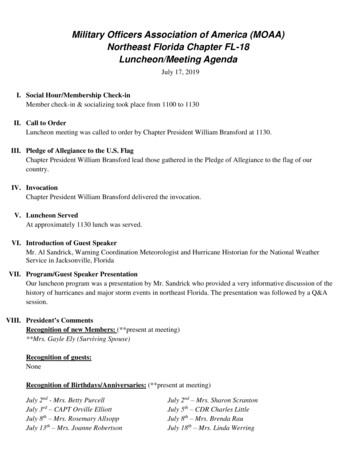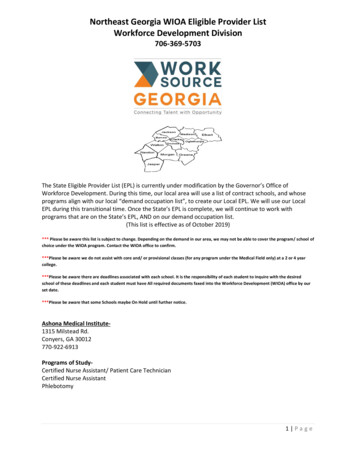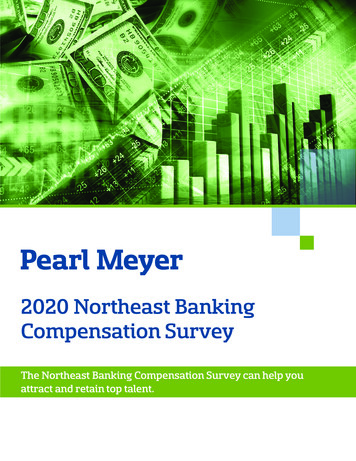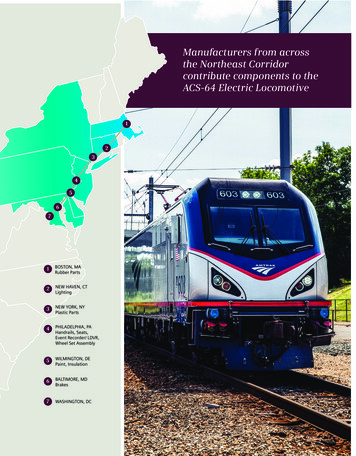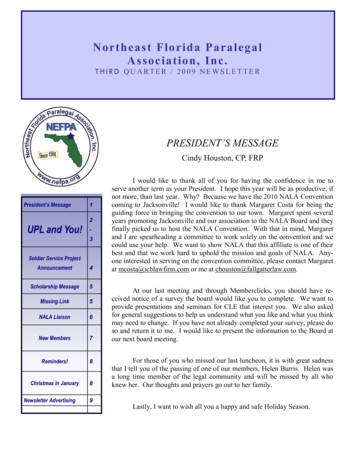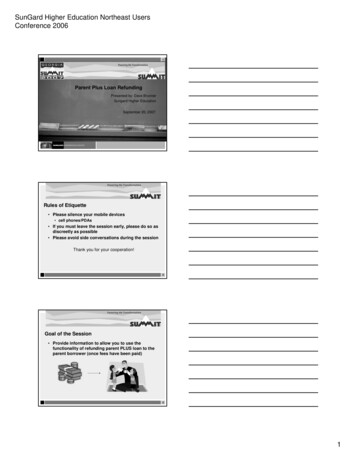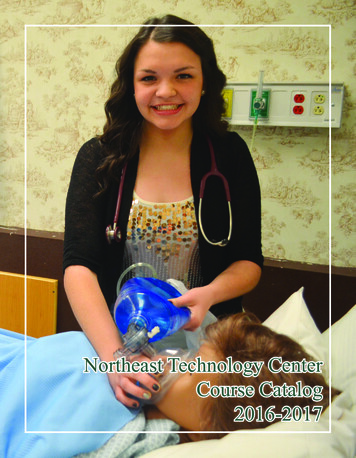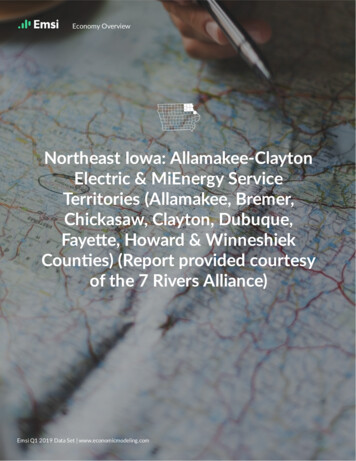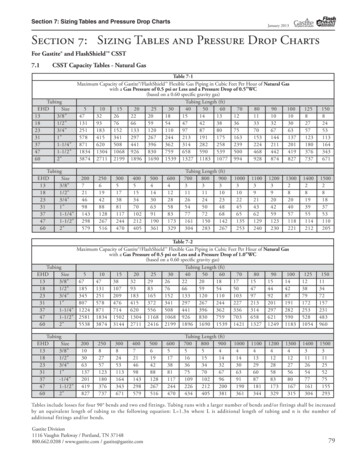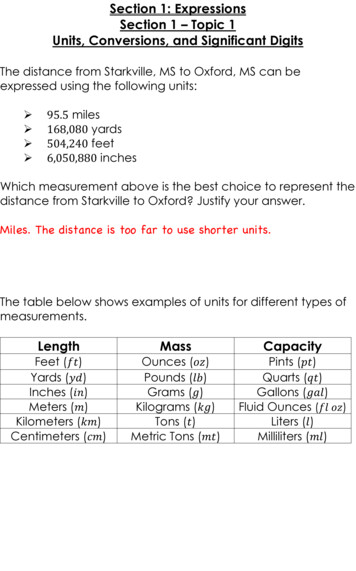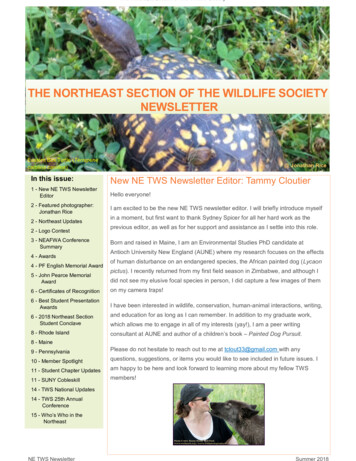
Transcription
The Northeast Section of The Wildlife Society1THE NORTHEAST SECTION OF THE WILDLIFE SOCIETYNEWSLETTEREastern Box Turtle (Terrapenecarolina carolina)@ Jonathan RiceIn this issue:New NE TWS Newsletter Editor: Tammy Cloutier1 - New NE TWS NewsletterEditorHello everyone!2 - Featured photographer:Jonathan RiceI am excited to be the new NE TWS newsletter editor. I will briefly introduce myself2 - Northeast Updates2 - Logo Contest3 - NEAFWA ConferenceSummary4 - Awards4 - PF English Memorial Award5 - John Pearce MemorialAwardin a moment, but first want to thank Sydney Spicer for all her hard work as theprevious editor, as well as for her support and assistance as I settle into this role.Born and raised in Maine, I am an Environmental Studies PhD candidate atAntioch University New England (AUNE) where my research focuses on the effectsof human disturbance on an endangered species, the African painted dog (Lycaonpictus). I recently returned from my first field season in Zimbabwe, and although Idid not see my elusive focal species in person, I did capture a few images of them6 - Certificates of Recognitionon my camera traps!6 - Best Student PresentationAwardsI have been interested in wildlife, conservation, human-animal interactions, writing,6 - 2018 Northeast SectionStudent Conclaveand education for as long as I can remember. In addition to my graduate work,8 - Rhode Islandconsultant at AUNE and author of a children’s book – Painted Dog Pursuit.which allows me to engage in all of my interests (yay!), I am a peer writing8 - Maine9 - PennsylvaniaPlease do not hesitate to reach out to me at tclout33@gmail.com with any10 - Member Spotlightquestions, suggestions, or items you would like to see included in future issues. I11 - Student Chapter Updatesam happy to be here and look forward to learning more about my fellow TWS11 - SUNY Cobleskillmembers!14 - TWS National Updates14 - TWS 25th AnnualConference15 - Who’s Who in theNortheastNE TWS NewsletterSummer 2018
The Northeast Section of The Wildlife Society2Featured Photographer: Jonathan RiceJonathan’s job title may be an ornithologist for the Carnegie Museum of Natural History, however, he sees himself asmore than just a “bird nerd.” He has a love for herpetology, and a growing interest and fascination for other taxa thathe doesn’t understand.Jonathan is constantly surprised and amazed by insects, snails, and plants. Although he claims he is not a very goodphotographer due to taking his time to make a connection with the animal he is watching and subsequently missinghis chance to photograph them, we beg to differ as the pictures he submitted are great!Are you interested in being our next featured photographer, or know someone who might be? Please email Tammyat tclout33@gmail.com! Jonathan RiceSolitary Sandpiper (Tringa solitaria)Photo courtesy of Jonathan RiceNORTHEAST UPDATESThe Northeast Section is excited to announce thatwe officially have our own logo!Congratulations to Laken Ganoe, a master's student atPhoto CaptionPenn State University,for submitting this winning entry!We look forward to using this on letterhead, newsletters,and future apparel.NE TWS NewsletterSummer 2018
The Northeast Section of The Wildlife Society3NORTHEAST UPDATES74TH ANNUAL NEAFWA CONFERENCE SUMMARYBy Emily JustThe 74th NEAFWA conference was held this past April in Burlington, Vermont, which feels like forever ago already!In fact, as I write this with temperatures close to 100 degrees outside, it is hard to imagine that we got stuck in an icestorm on the way to the conference! Although the weather didn’t cooperate as well as hoped, the conference was agreat success and had numerous educational workshops and speaker sessions. The Northeast Section sponsoredtwo successful workshops, which we hope some of you were able to attend. Let us know if you did! The firstworkshop discussed designing effective human dimensions research tools and how best to utilize the data. And oursecond workshop ventured outside to check out the use of unmanned aerial vehicles for wildlife research.We had our NE Section Executive Committee meeting onSunday afternoon and I couldn’t believe it was my last meetingas President already! The past year flew by, but I had a greattime and am really excited about this upcoming year. Weintroduced our new board members, discussed the newlyadopted changes in our bylaws, and got caught up on what’sbeen going on in the state and student chapters. We love thatmore state chapter representatives joined us and look forwardto incorporating state and student chapter leaders in more ofour meetings! Following the meeting we headed to theWelcome to Vermont Reception where the beer and colleagueswere located! I love the welcome receptions because everyoneis so excited to start chatting and discussing their work andwhat’s going on in their states. Plus, they usually always havegood, local food and drink!Monday started out with amazing Plenary sessions, including aScience Slam. I loved this concept as we got to hear amazingstories about research in a short timeframe from four biologists.It was a great way to learn about what’s going on in a fun,enthusiastic manner. The Plenary also featured a high schoolstudent who spoke about her experience as a hunter and herthoughts on connecting people and nature. Jonathan RiceGreat Gray Owl (Strix nebulosa)The Awards ceremony followed the Plenary, which offered anopportunity for so many wonderful biologists to be recognized for their hard work and dedication. I was very honoredto present several awards to northeast Section members, including the P.F. English Award and our John PearceMemorial Award. Learn more about our winners on the pages that follow.Monday and Tuesday were filled with symposia, technical sessions, and posters. I always try to take notes on all thesessions I attend because it can become such a whirlwind and make it easy to forget what you’ve learned. Iattended a lot of presentations regarding game management, habitat conservation, climate changes, and diseases.There were so many wonderful options that it was hard to choose.Monday night we held our NE Section general meeting and reception where we introduced our new president,secretary, and president-elect. This is where I got to sit back and enjoy my new role as past president! Following ourmeeting was the dinner at the ECHO, Leahy Center for Lake Champlain. I highly recommend visiting the LeahyCenter if you didn’t get to attend this conference and are in the Burlington area.As a state employee, I can only attend 1, maybe 2, conferences a year and I always make sure I come to theNEAFWA conference. I learn so much about what’s happening in the northeast and have met and become friendswith so many incredible biologists. And of course, I come to interact with the NE Section of TWS. I hope you canjoin us next year in Groton, CT!NE TWS NewsletterSummer 2018
The Northeast Section of The Wildlife Society4NORTHEAST UPDATESAWARDSP. F. English Memorial Award:The P.F. English Memorial Award is presented annually by the Northeast Section of The Wildlife Society to theoutstanding undergraduate senior student of wildlife biology or wildlife management within the region. Its purpose isto acknowledge and encourage students, and to perpetuate the name of the late P.F. English, an outstandingeducator, sportsman, and inspiration to youth.This year’s award winner, Danielle Bear, meets all of these criteria.As an undergraduate wildlife major at PennsylvaniaState University, Danielle achieved a 3.61 gradepoint average. Active in the Student Chapter of TheWildlife Society and within the Department, sheimpressed the faculty with her quiet, determineddemeanor and enthusiasm and involvement, bothinside and outside of the classroom.Danielle came to Pennsylvania State University in2015, following a move from California where sheearned an Associate degree in Math and Sciencefrom Victor Valley College, and a 3.8 grade pointaverage. While earning her degree in California, sheserved the United States in the U.S. Army NationalGuard as a Health Care Specialist, providing primarymedical care, training, and support for 150 U.S.soldiers and civilians.While embarking on her Bachelor’s degree at PennState, she excelled as a “nontraditional student”given the fact that she is also the mother of a 9-yearold daughter, and commutes nearly 70 miles oneway to campus. Even with the challenge ofmaintaining a home, raising a daughter, andmanaging a 140 mile round trip commute, Daniellehas consistently shown herself to be a top student.Her capstone project in her Wildlife PopulationDynamics class was the best among students in theclass that year. She has consistently been on the Dean’s List and has earned perfect grades in all of her wildlifecourses. Outside of the classroom, Danielle has worked as a research assistant on a PhD student’s study of fencelizards, and she received a 2,000 undergraduate research award on how environmental conditions influencepopulations of red-backed salamanders.Danielle is an encouragement and inspiration to Penn State’s faculty and to her peers. She has set high standardsfor herself, has proven to be an exemplary undergraduate, and is looking forward to entering the profession upongraduation.NE TWS NewsletterSummer 2018
The Northeast Section of The Wildlife Society5NORTHEAST UPDATESAWARDS CONTINUED.John Pearce Memorial AwardThe John Pearce Memorial Award is reserved for outstanding members of our section who have madesignificant contributions to the wildlife profession.This year’s recipient, Dr. Scott Williams, showed exemplary evidence of such contributions through his workwith the Wildlife Society, his research in wildlife biology and management, and his community outreach. He hasserved the Northeast Section of the Wildlife Society through numerous positions ranging from Treasurer to nowPresident-Elect in addition to his work as a scientist and certified Wildlife Biologist at the Connecticut AgriculturalExperiment Station.At this institution, Scott’s research has spanned from white-tailed deer behavior and management to Lymedisease ecology. He gives back to his community by volunteering on multiple town commissions, lending them hisexpertise for environmental planning and administrative decisions. And as if that weren’t enough, over the pastdecade, Scott has also encouraged the next generation of wildlife biologists as an adjunct professor and committeemember for graduate students at the University of Connecticut.NE TWS NewsletterSummer 2018
The Northeast Section of The Wildlife Society6NORTHEAST UPDATESCertificates of RecognitionThe Northeast Section awards certificates of recognition to people who have made noteworthy contributions toknowledge about wildlife or wildlife management, furthered public understanding, or who have made available increased wildlife habitat. This year, we recognize two of our colleagues:For tremendous contributions to our knowledge of White Nose Syndrome in cave bats, including more than 20 publications on the disease, achieved through collaborations with academic researchers, NGOs, and government agencies, with knowledge gleaned through field work that requires not only advanced technical skills but also taking greatphysical risks, the Section recognizes Gregory G. Turner of the Pennsylvania Game Commission.For recognizing the relationship between outbreaks of West Nile Virus and sharp declines in ruffed grouse populations, following through with research that proved that relationship, and for her outreach efforts that have resulted ina fabulous rapport with Pennsylvania’s grouse hunters, to the point of them understanding and supporting the needfor the elimination of the late grouse season, the Section recognizes Lisa M Williams of the Pennsylvania GameCommission.Best Student Presentation AwardsEach year at this conference, the Northeast Section judges the student presentations and selects a best graduateand best undergraduate student presentation. We would like to recognize last year’s winners at this time.The Best Graduate Student Presentation at the 2017 NEAFWA conference goes to Daniel Ellingwood, University ofNew Hampshire, for his presentation, “Mortality and Productivity in New Hampshire and Maine’s Moose Population.”The Best Undergraduate Student Presentation at the 2017 NEAFWA conference goes to Avery Owers, West Virginia University, for her presentation, “Evaluating Population Genetics and Movement Patter’s of West Virginia’s Bobcats.”2018 Northeast Section Student ConclaveBy Laken GanoeThe forecast for April 13-15 called for a blustery late-winter weekend in Starksboro, VT, but not even the impendingice storm discouraged the 165 students from 15 Student Chapters across the Northeast Section from attending the2018 Northeast Student Conclave. Students arrived at Vermont’s Common Ground Center on Friday and unpackedtheir vans and cars to settle in for a weekend full of wildlife. After a warmsupper and meeting and reuniting with friends from different states, allattendees crowded into the mess hall for the opening ceremonies. Theweekend kicked off with a welcome by Dr. Valorie Titus - advisor for thehosting Green Mountain College Student Chapter – and a friendlyintroduction to the keynote speaker, Tom Decker. Tom is a CertifiedWildlife Biologist and works for the U.S. Fish & Wildlife Service for theNortheast Region. Students learned what it is to be a “real-Vermonter,” thecustoms of a town hall meeting, and some information about wildlifeconservation in the state of Vermont where Tom previously worked for theVermont Fish and Wildlife Department. TWS President John McDonaldmade an appearance at the opening ceremonies, giving students somebackground on The Wildlife Society and some insight into the current Jonathan Ricepolitical stances at the forefront of the concerns of The Society.Eastern Red-spotted Newt(Notophthalmus viridescens)NE TWS NewsletterSummer 2018
The Northeast Section of The Wildlife Society7NORTHEAST UPDATES2018 Northeast Section Student Conclave Continued.Excitement filled the mess hall early Saturday morning as students received their workshop schedules for the day.A total of 17 workshops were held over 9 hours including, Avian Necropsies, Radio Telemetry, Wildcrafting,Campfire Cooking, Non-invasive Sampling Techniques, Macroinvertebrate Sampling, and Rocket Netting to name afew. Workshop leaders represented four states and came from a variety of backgrounds and levels of experience,giving students a look at the broad spectrum that is wildlife biology. With the weather turning sour, attendees weregiven the opportunity to rearrange their sleeping areas and change into some warmer clothes before dinner.However inclement the weather, it could not dampen the student’s building excitement for the evening’s activities:Quiz Bowl.The Quiz Bowl Competition began at 7:00 with 13 teams competing for the honor of Quiz Bowl Champions.Questions such as “What does CITES stand for?” and “Who wrote Game Management?” were answered withconfidence, while clever (incorrect) answers were given for others, resulting in a chorus of laughs from the audience.After a challenging and entertaining few hours, the final match was set. The two schools, Delaware Valley andSUNY ESF, raced to be the first to buzz in and answer correctly. SUNY ESF was victorious in the end, winning theWhite Peacock as the new 2018 Northeast Quiz Bowl Champions. Although they were defeated in the final round,Delaware Valley still went home with some hardware - the Cock of the Keystone – for being the highest placingPennsylvania team.Photo courtesy of possibility-cp.comThe final day of the weekend came early, and students joined together in the mess hall one last time for the finalspeaker. Spc. Rob Sterling, a game warden for the Vermont Game and Fish Department, shared stories from theforce with his trusty canine companion, Crockett. After packing lunches for the road home, students said goodbye tofriends - both new and old - before setting off for their own destinations with a pack full of new wildlife information,good memories, and itching to return for the 2019 Northeast Student Conclave.Student Chapters represented: Green Mountain College (Host), California University of Pennsylvania, DelawareValley University Framingham State College, Juniata College, Paul Smith’s College, Penn State Dubois, Penn StateUniversity Park, Rutgers University, SUNY Cobleskill, SUNY ESF, University of Delaware, University of Maine,University of Maryland, West Virginia University.If your Student Chapter was unable to attend this year, come join us next year in Maine! Workshop leaders arealways in short supply at Student Conclaves, so if you are interested in sharing your expertise with students, pleasecontact the Student Affairs Committee to get on our list of available workshop leaders! As always, if you have anyquestions or recommendations to improve our student’s experiences, please feel free to contact Laken Ganoe atlsg18@psu.eduNE TWS NewsletterSummer 2018
The Northeast Section of The Wildlife Society8NORTHEAST UPDATESRHODE ISLAND2018 American Black Bear SurveyThe URI Wildlife Genetics and Ecology Lab is continuing with their American black bear survey in Rhode Island.Volunteers throughout the state have been tasked with surveying sites across the state collecting hair samples forgenetic testing. Surveys run from June through mid-September.Parking Lot PloversA pair of piping plovers chose a most unlikely location to nest this summer: an isolated sprig of vegetationsprouting from a small crack in the pavement at Roger Wheeler State Beach. In coordination with USFWS,RIDEM protected the plovers and their nest by installing silt fencing to create a protected, walled corridor from thenest in the parking lot to the dunes with sand sprinkled onto the asphalt to encourage nestlings to migrate to thebetter habitat of the dunes. A combination of signage and volunteers helped protect the nest from pedestrian andvehicular traffic. Three chicks and their parents finally made the walk from the pavement nest to the beach acouple weeks after the nest was spotted.Wild Turkey Brood SightingsRIDEM is again asking for the public’s participation in reporting sightings of wild turkey hens and hens with broods.The wild turkey population in Rhode Island is believed to be increasing and this citizen science effort will help withthe State’s research. Spring harvest reports indicate that there has been a 20% increase from 2017. RIDEMinstituted a wild turkey restoration program that ran from 1980 – 1996 that aided in the establishment of new flocksseven Rhode Island towns. Wild turkey reports can be submitted online or submitted via phone at (401) 789-0281.State Preserves an additional 101 acres in northwestern Rhode IslandAn additional 101 acres in Glocester, RI that abuts the existing Durfee Hill Management Area is now included inthe State’s wildlife management area lands. The Britton Family sold the land to the State in May. The sale of thisland contributes to over 5,200 acres of state-owned protected lands. The public is now able to access this land fora wide range of recreational opportunities including wildlife viewing, hiking, and hunting. The land provides a widerange habitats including upland oak hickory forest, coniferous uplands, a cold -water stream, a high terraceforested wetland complex, and old fields.The Maine Chapter has been busy with networking opportunities !NE TWS NewsletterSummer 2018
The Northeast Section of The Wildlife Society9NORTHEAST UPDATESPENNSYLVANIAThe PA TWS Chapter held its annual conference in March in State College,PA. The theme for this year was “Using Technology to Understand Ecology:Innovations that Enhance Wildlife Management.” Overall attendance for theconference was 142 people (80 professionals, 55 students, and 7 nonmembers). Four wildlife workshops were held on Friday Ma
Antioch University New England (AUNE) where my research focuses on the effects of human disturbance on an endangered species, the African painted dog (Lycaon pictus). I recently returned from my first field season in Zimbabwe, and although I did not see my elusive focal species in perso
